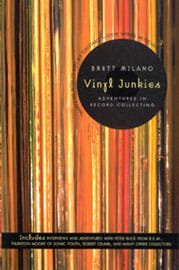Vinyl Junkies

Every guy with a record collection and a girlfriend should read Brett Milano’s Vinyl Junkies with her as relationship therapy. The book follows die-hard collectors from different walks of life—from R. Crumb’s country and blues 78s to several vinyl addicts in Milano’s native Boston, where he writes for the Boston Phoenix and the Boston Herald. The book presents an engaging look at a diverse subculture—from the rabid nerd completists to the musicians and industry types you would expect to have a serious relationship with their records (including R.E.M.’s Peter Buck and Sonic Youth’s Thurston Moore). But Milano also writes about “normal” people with jobs and relationships and whose fashion choices range outside jeans and obscure punk T-shirts.
-

-

-

-

-

-

-

-

-

-

-

-

-

-

-

-

-

-

-

-

-

-

-

-

-

-

-

-

-

-

-

-

-

-

-

-

-

-

-

-








































